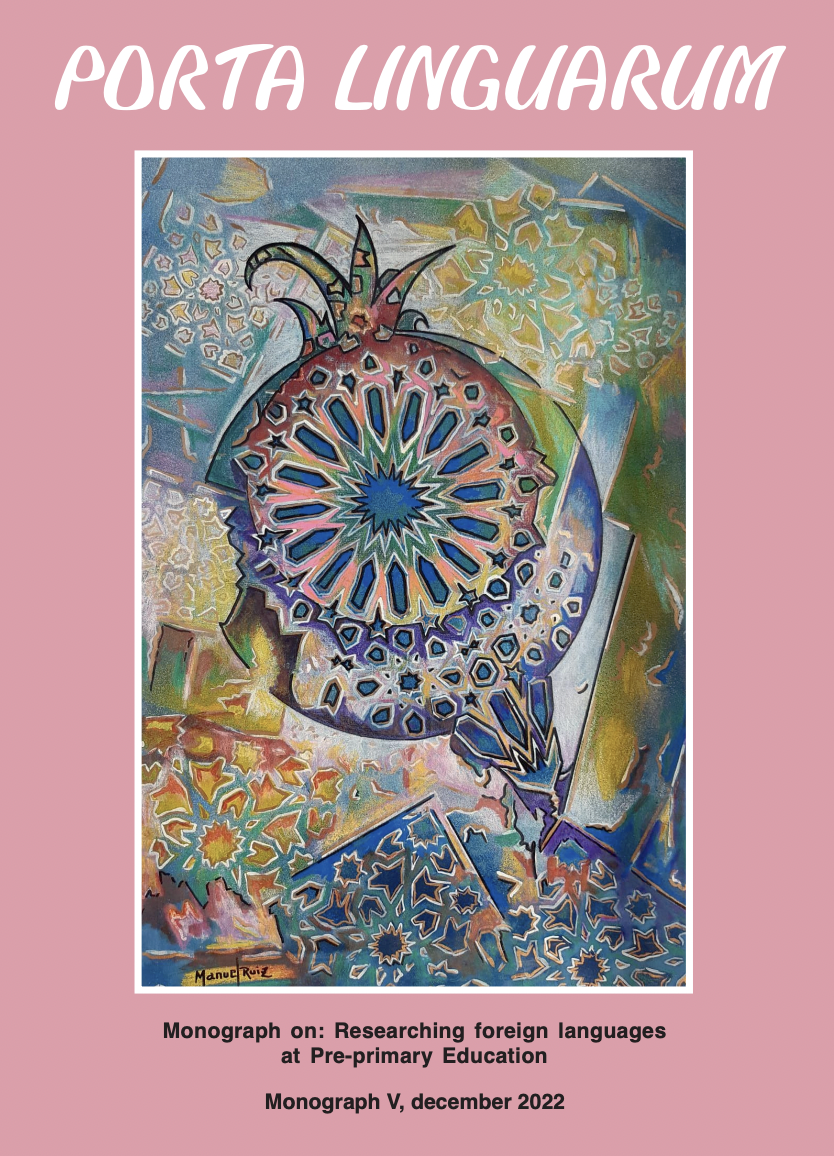Teaching foreign languages at the pre-primary level in a monolingual setting: the case of Poland
DOI:
https://doi.org/10.30827/portalin.vi.26218Keywords:
pre-primary education, foreign language, language acquisition, pedagogy, ecologyAbstract
In Poland, teaching a foreign language to very young children, i.e. aged 6 and below, has had a relatively long tradition in both educational services and research, which grew out of strong parental aspirations for their children’s educational, and consequently vocational, achievements in the globalized job market.
The goals of the paper are twofold: firstly, it aims to outline the evolution of research directions in language teaching methodology to very young learners (i.e. below 6) over the last three decades. In this respect three major strands are distinguished, i.e. the language acquisition approach, the pedagogical approach and the ecological approach. Secondly, Polish research in pre-primary education is going to be outlined against the backdrop of these major trends in applied linguistics. It is believed that some of the findings may bear relevance to other contexts in which very early teaching of foreign languages is being implemented.
Downloads
References
Asher, J. (1977). Learning another language through actions: the complete teacher’s guidebook. Sky Oaks Publications.
Bielicka, M. (2017). Efektywność nauczania języka niemieckiego na poziomie przedszkolnym i wczesnoszkolnym w dwujęzycznych placówkach edukacyjnych w Polsce. [Effectiveness of teaching German at pre-primary and primary levels in Polish bilingual kindergatens]. Poznań: Wydawnictwo Naukowe PWN.
Bogdanowicz, M., Bogdanowicz, K. M., & Łockiewicz, M. (2015). The Good Start Method for English. Metoda Dobrego Startu We Wspomaganiu Rozwoju i Uczeniu Się Dzieci Rozpoczynających Naukę Języka Angielskiego [Good Start Method in Supporting Development and Learning of Children Who Start to Learn English]. Gdańsk: Wydawnictwo Harmonia.
Bourdieu, P. (1991). Language and symbolic power. Polity Press.
Council of Europe. (2006). Plurilingual Education in Europe. 50 years of International co-operation. Strasbourg: Language Policy Division. http://www.coe.int/t/dg4/linguistic/Source/PlurinlingalEducation_En.pdf
Edelenbos, P., R. Johnstone, & A. Kubanek. (2006). Languages for the children in Europe: Published research, good practice and main principles. Retrieved from http://ec.europa.eu/education/policies//lang/doc.youngsum_en.pdf.
Enever, J. (2018). Policy and politics in global primary English. Oxford University Press.
Ervin - Tripp, S. M. (1974). ‘Is second language learning like the first?’ in Hatch, E.M. (ed.) 1978. Second language acquisition: A book of readings. Newbury House.
European Commission. Presidency Conclusions, Barcelona, 2002, (http://ec.europa.eu/languages/documents/doc4794_en.pdf)
European Commission.2011. Language learning at pre-primary school level: making it efficient and sustainable. Policy Handbook (http://ec.europa.eu/languages/pdf/ellpwp_en.pdf)
Fenson, L., Dale, P., Reznick J. et al. (1993). MacArthur-Bates Communicative Development Inventories. User's guide and technical manual. Singular Publishing.
Iluk, J. (ed.) (2015). Nauczanie języków obcych w przedszkolu i na etapie wczesnoszkolnym na przykładzie języka niemieckiego.[Teaching foreign languages at kindergarten and lower-primary school: the case of German]. Wydawnictwo Uniwersytetu Ślaskiego.
Iluk, J., & Jakosz, M. (2017). Storytelling and its effectiveness in developing receptive skills among children. Studia Linguistica Universitatis Iagellonicae Cracoviensis, 2017, 134, 337-352, https://www.ejournals.eu/Studia-Linguistica/2017/ Issue-4/art/10285/.
Komorowska, H. & Krajka, J. (2016). Monoligualism-bilingualism-multilingualism. The teachers’ perspective. Peter Lang.
Konderak T. (2019). Specyfika edukacji ocojęzycznej dzieci w wieku przedszkolnym (na przykładzie języka francuskiego).[Specificity of foreign language education of kindergarten childrenon the example of French]. Unpublished PhD thesis. Warsaw University.
Krashen, S. & T. Terell. (1988). The natural approach. Language acquisition in the classroom. Prentice Hall.
Kucaj K. (2013). Nauczanie języków obcych dzieci w wieku przedszkolnym w Polsce (na materiale języka rosyjskiego).[Teaching foreign languages to kindergarten children: a case of Russian]. Unpublished PHD thesis. Uniwersytet Rzeszowski.
Lenneberg, E.H. (1967). Biological Foundations of Language. New York: Wiley.
Leśniewska, J., & Pichette, F. (2014). Songs vs. stories: impact of input sources on ESL vocabulary acquisition by preliterate children. International Journal of Bilingual Education and Bilingualism https://doi.org/10.1080/13670050.2014.960360
Łockiewicz, M., Sarzała-Przybylska, Z., & Lipowska, M. (2018). Early predictors of learning a foreign language in pre-school - Polish as a first language, English as a foreign language. Frontiers in Psychology. https://doi.org/10.3389/fpsyg.2018.01813
Ministry of Polish Education (2008). Regulation on the New Core Curriculum for General Education in Primary School. Dziennik Ustaw [Journal of Laws] 23 December 2009 Poz.17. http://isap.sejm.gov.pl/DetailsServlet?id=WDU20090040017 (accessed 12 July).
Muñoz, C. (Ed.) (2006). Age and the rate of foreign language acquisition. Multilingual Matters.
Olpińska-Szkiełko, M. (2013). Bilinguale Kindererziehung: ein Konzept für den polnischen Kindergarten, Studia Naukowe IKSI UW, tom 8: https://portal.uw.edu.pl/documents/7732735/0/SN+8+Magdalena+Olpi%C5%84ska-Szkie%C5%82ko+-+Bilinguale+Kindererziehung.pdf
Rokita, J.(2007). Lexical development in early L2 acquisition. Wydawnictwo AP. Available at: http://hdl.handle.net/11716/2073
Rokita-Jaśkow, J. (2013). Foreign language learning at pre-primary learning: parental aspirations and educational practice. Wydawnictwo UP. Available at: http://hdl.handle.net/11716/6563
Rokita-Jaśkow, J. (2015). Parental visions of the children’s future as a motivator for an early start in a foreign language. Studies in second language learning and teaching, 5 (3),455- 472 doi:10.14746/ssllt.2015.5.3.6
Rokita-Jaśkow, J. (2019). Parental involvement in very early L2 acquisition. In Rokita-Jaśkow, J. & M. Ellis. (Eds). Early instructed SLA:Pathways to competence (pp.191-205). Multilingual Matters.
Rokita-Jaśkow, J., & Pamuła-Behrens, M. (2019). Policy and practice in early FLL: the case of Poland. In Rokita-Jaśkow, J. and M. Ellis. (Eds). Early instructed SLA: Pathways to competence. (pp.11-25) Multilingual Matters.
Scheffler, P. (2015). Introducing very young children to English as a foreign language. International Journal of Applied Linguistics. https://doi.org/10.1111/ijal.12035
Scheffler, P., & Domińska, A. (2018). Own-language use in teaching English to preschool children. ELT Journal, 72(4), 374–383. https://doi.org/10.1093/elt/ccy013
Scheffler, P., Jones, C., & Domińska, A. (2021). The Peppa Pig television series as input in pre‐primary EFL instruction: A corpus‐based study. International Journal of Applied Linguistics, 31(1), 3–17. https://doi.org/10.1111/ijal.12298
Sopata, A. (2009). Erwerbsteheoretische und glottodidaktische Aspekte des Fruehen Zweitspracherwerbs Sprachentwicklung der Kinder im naturlichen und schulischen kontext. UAM. https://repozytorium.amu.edu.pl/bitstream/10593/8707/1/sopata_tekst.pdf
Sparks, R. L., Patton, J., Ganschow, L., Humbach, N., & Javorsky, J. (2006). Native language predictors of foreign language proficiency and foreign language aptitude. Annales of Dyslexia, 56, 129–160. doi: 10.1007/s11881-006-0 006-2
van Lier, L. (2004). The ecology and semiotics of language learning: A sociocultural perspective. Kluwer Academy.
Woś, M. (2017). EDUTAINMENT w procesie opanowania języków obcych przez najmłodsze dzieci w środowisku domowym. In J.Rokita-Jaskow & W. Król-Gierat(Eds). Wczesny start jęyzkowy:Wybrane zagadnienia [An early start in a foreign language. Selected issues] (pp.106-122). Wydawnictwo Uniwersytetu Pedagogicznego.



















